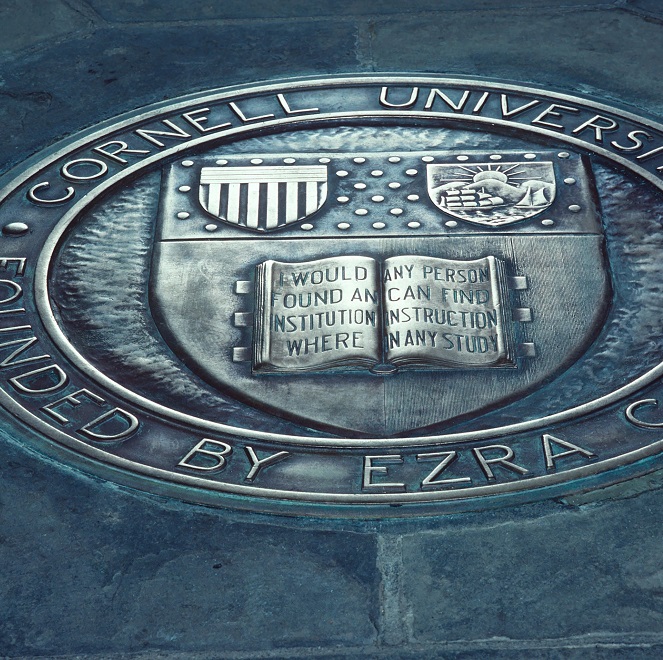News and Events
Full listing
March 11, 2021
Catalyzed by a Cornell Atkinson Center for Sustainability grant and prompted by other Cornell eco-friendly research over the past decade like the Cornell Fuel Cell Institute and the university’s Energy Materials Center, the Standard Hydrogen Corporation (SHC) and National Grid announced plans March 11 to build the first hydrogen “energy station” of its kind in the nation.
The SHC Energy Transfer System will be built in New York’s Capital Region; completion is expected by late 2022.
Pending regulatory approval, the facility will be the first demonstration of Standard Hydrogen’s innovative, multi-use, renewable hydrogen-based energy storage/delivery system. It will be available to fill fuel cell-powered automobiles with carbon-free energy, while also fulfilling other energy needs.
February 19, 2021
Cornell scientists have identified a new contender when it comes to quantum materials for computing and low-temperature electronics.
Using nitride-based materials, the researchers created a material structure that simultaneously exhibits superconductivity – in which electrical resistance vanishes completely – and the quantum Hall effect, which produces resistance with extreme precision when a magnetic field is applied.
February 18, 2021
A new study identifies a mechanism that makes bacteria tolerant to penicillin and related antibiotics, findings that could lead to new therapies that boost the effectiveness of these treatments.
Antibiotic tolerance is the ability of bacteria to survive exposure to antibiotics, in contrast to antibiotic resistance, when bacteria actually grow in the presence of antibiotics. Tolerant bacteria can lead to infections that persist after treatment and may develop into resistance over time.
The study in mice, “A Multifaceted Cellular Damage Repair and Prevention Pathway Promotes High Level Tolerance to Beta-lactam Antibiotics,” published Feb. 3 in the journal EMBO Reports, reveals how tolerance occurs, thanks to a system that mitigates iron toxicity in bacteria that have been exposed to penicillin.
February 4, 2021
Elucida Oncology, a biotechnology company based on C Dots – ultra-small nanoparticles developed at Cornell that show promise in identifying and fighting cancer – recently secured $44 million in financing, in addition to $28 million raised in 2018.
C Dots, originally called Cornell dots, were created more than 15 years ago in the lab of Uli Wiesner, the Spencer T. Olin Professor of Engineering in the Department of Materials Science and Engineering. Wiesner has been working to put C Dots to use in the fight against cancer ever since.
January 28, 2021
In your blood are thousands of bits of loose DNA. These short strands of genetic material come from all over your body; old cells die, and new ones take their place.
“The tissues in your body are constantly replenishing,” said Iwijn De Vlaminck, the Robert N. Noyce Assistant Professor in Life Science and Technology in the Nancy E. and Peter C. Meinig School of Biomedical Engineering.
January 25, 2021
Héctor D. Abruña, the Émile M. Chamot Professor of Chemistry in the College of Arts and Sciences, has been honored by the American Chemical Society (ACS) with the ACS National Award in Analytical Chemistry for his pioneering work in electrochemistry, including the development of fuel cell and battery materials.
The ACS award is a tribute to Abruña’s long, influential career, said Brian Crane, the George W. and Grace L. Todd Professor and chair of the Department of Chemistry and Chemical Biology.
“This is a major award,” Crane said, “perhaps the highest honor in this country for Professor Abruña’s field of chemistry.”
January 19, 2021
January 2021:A Cornell collaboration led by KIC Executive Committee member Huili Grace Xing has found a way to grow a single crystalline layer of alpha-aluminum gallium oxide that has the widest energy bandgap to date – a discovery that clears the way for new semiconductors that will handle higher voltages, higher power densities and higher frequencies than previously seen.
January 19, 2021
A Cornell collaboration has found a way to grow a single crystalline layer of alpha-aluminum gallium oxide that has the widest energy bandgap to date – a discovery that clears the way for new semiconductors that will handle higher voltages, higher power densities and higher frequencies than previously seen.
The collaboration was led by co-senior authors Debdeep Jena and Huili Grace Xing, both professors in electrical and computer engineering and in materials science and engineering. The team also included David Muller, the Samuel B. Eckert Professor in Applied and Engineering Physics, who specializes in electron microscopy, and Darrell Schlom, the Herbert Fisk Johnson Professor of Industrial Chemistry, who grows oxide materials for electronic uses.
December 7, 2020
Associate Professor Greg Fuchs and Professor Jie Shan both received 2020 Research Excellence Awards from Cornell Engineering, given to faculty in recognition of research contributions and leadership.
December 2, 2020
December 2020: A collaboration led by KIC faculty members Iwijn de Vlaminck, Ilana Brito, and Warren Zipfel has developed an imaging tool to create intricate spatial maps of the locations and identities of hundreds of different microbial species, such as those that make up the gut microbiome. The tool will help scientists understand how complex communities of microorganisms interact with each other and also their environment.

